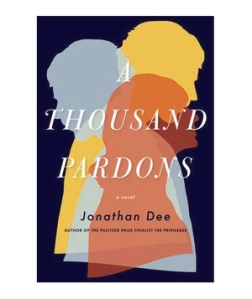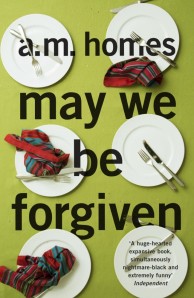So I recently finished reading Jonathan Dee’s new book, A Thousand Pardons. It’s quite enjoyable, describing a mother and daughter’s attempts to rebuild their lives after their husband/father has a catastrophic meltdown. The woman discovers she has a talent for PR, usually working on behalf of men who have transgressed in some spectacularly public way. She ends up representing a childhood friend who has become a Hollywood star, while her daughter and ex-husband try to make sense of their own lives.
The book is a satire about how the media is used to manipulate perceptions of real people: it shows with great clarity the cynicism about human nature that informs a lot of PR activity, especially (but not exclusively) when a star has proven himself or herself to be all too human. It doesn’t quite tell us things we don’t already know, but by focussing intensely on the topic it does force home some truths about our responses to, and reception of, the media.
Given that the book is (partially) about misleading PR campaigns, I felt a bit confused by the blurb on the back from Jennifer Egan, who describes the story as “a genuine literary thriller.” While browsing in the bookshop, I had taken that to mean that the book was a thriller with literary qualities – sort of along the lines of Graham Greene, I suppose.
I think Egan must have meant instead that its literary qualities are thrilling, since the book does not (in any way that I could discern) involve tension or the detection and revelation of any great secrets. In fact, it’s actually quite similar to Egan’s work in that it moves along through a series of shifting moods, with the author’s wry humour being used to soften the negativity of the experiences being forced upon the characters.
I was also interested in its opening chapter, which repeats a technique I’ve seen in a few American novels recently. The opening chapter – which runs to just under 50 pages – describes in fascinated and appalled detail the gradual self-destruction of the central male protagonist. His actions are largely self-inflicted and, without wishing to give much away, revolve around his misplaced attraction for a much younger woman. We get more action – more sudden transformations in the characters’ lives – in the first chapter than in most of the rest of the book. As a technique, it works effectively: we watch a catastrophe unfolding with alarming speed, and then spend another 200 pages slowly picking through its consequences.
I’ve seen that kind of technique before, and recently too, in AM Homes’s May We Be Forgiven. That book also has a brilliant opening sequence in which another middle aged man ruins his own life and in the process destroys that of everyone around him too. And as in Dee’s book, the first fifty pages move at an invigorating but slightly frightening pace that the rest of the book can’t match.
It’s noticeable that both books highlight contrition in their titles. I’m interested in the fact that we’re seeing so much guilt in American fiction these days. Of course it’s always been there (cf. The Scarlet Letter) but it’s noticeable now that so much of it is focused on middle-aged men – and that so much of it is based on sexual trangression – or, perhaps more correctly, sexual foolishness.
Philip Roth’s Sabbath’s Theater is one of the best recent examples of this kind of writing (who can forget the scene in which Sabbath is caught going through his best friend’s teenage daughter’s underwear?), but I think this kind of writing probably owes most to Jonathan Franzen. The opening sequence of his Corrections shows Chip Lambert’s life being destroyed, again because of an inappropriate infatuation with a student – something that also happens in Chad Harbach’s The Art of Fielding. And the male characters in Jeffrey Eugenides’ Marriage Plot don’t even make it to middle age before their sexual confusion overcomes them.
I’m not sure why so many American novels display an interest in sexual shame at the moment. It probably has something to do with the ubiquity of porn in most western cultures at the moment. And it probably has something to do with tradition: sex is a matter of shame and/or confusion not only in Hawthorne but also in Melville and even at times in Hemingway. And of course it’s a major feature of Philip Roth’s work.
But the question I find myself thinking about is whether this guilt is operating on a metaphorical level too. What does it tell us about America today so many of its authors are having so much fun with sexual shame?

